I’m running a bit late on it this year, but the Off on a Tangent political endorsements for the 2013 elections are coming soon. This year, Virginia citizens will be voting for Governor, Lieutenant Governor, Attorney General, and our local representatives in the House of Delegates. Additionally, citizens of Loudoun County will be voting on four bond referendums. As in past years, Off on a Tangent will provide live election-night coverage at http://election.scottbradford.us/.
As I work on researching the candidates and issues and preparing my formal endorsements, I thought I would look back at my past endorsements and do some statistical analysis—an exercise I last did in 2010.
I have always considered myself to be a political independent. I certainly tilt toward the Republican side of the spectrum, with a healthy dose of ‘small-l’ libertarianism thrown in . . . but I rarely ever endorse, or vote for, a straight party-line ticket. I always try to make a serious, dispassionate evaluation of every candidate and issue before me, and then endorse and cast my own ballot for the ones that I believe are the best available options. I pay little or no attention to party affiliation during this process, and I don’t plan to change that any time soon.
Candidate Endorsements
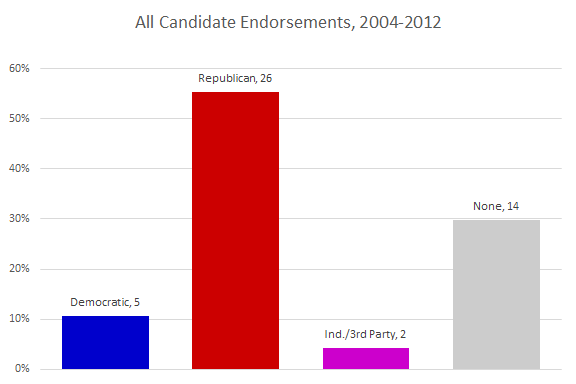
Between 2004 and 2012, I have reviewed and evaluated 117 candidates for forty-seven seats or offices—an average of 2.5 candidates per seat and 5.2 seats per year. I have made thirty-three endorsements—an average of 3.66 per year—of which five went to Democrats (10.6 percent), twenty-six to Republicans (55.3 percent), and two to independent or third-party candidates (4.3 percent). In races for fourteen seats or offices, I made no endorsement (29.8 percent) . . . either because there was no deserving candidate or because the office serves no purpose.
The breakdown varies some depending on the level of the office or seat in question.
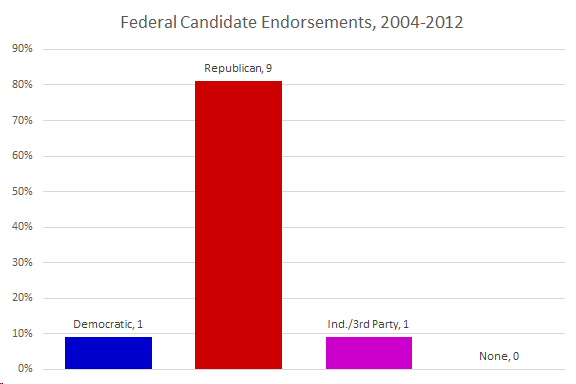
In races for federal offices—President of the United States, U.S. House of Representatives, and U.S. Senate—my Republican leanings are very pronounced, in large part due to my concerns about the Tenth Amendment and a proper separation of powers between the federal and state governments, as well as my rejection of unnecessary government interference in the economy and my support for an active foreign policy. Here, I endorsed one Democrat, nine Republicans, and one independent or third-party candidate. I have made an endorsement in every federal-level election that has been before me since 2004.
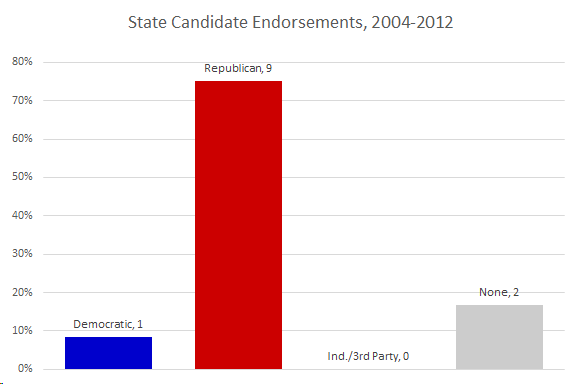
Things looks broadly similar at the state level, with endorsements going to one Democrat and nine Republicans. I have not yet made any independent or third-party endorsements at the state level. In two races I chose to make no endorsement. My state level concerns are more focused on civil rights (e.g., the right to life, free speech and press, the right to bear arms, etc.), as well as issues like transportation, education, low taxes, and reducing unnecessary government regulation. Both major parties tend to do very poorly on education issues, but my civil rights, transportation, taxation, and regulation concerns all tend to point me toward the Republican Party in Virginia.
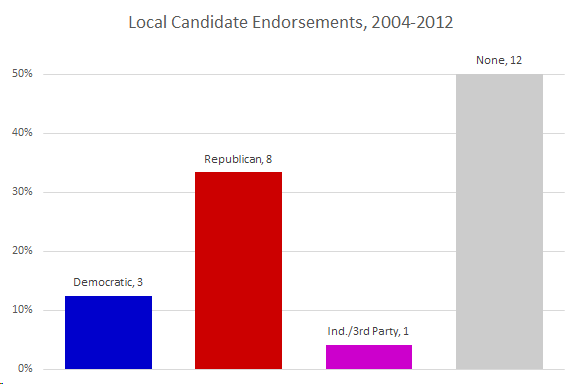
In the local races, things get much stranger. Most obviously, in twelve local races—fifty percent of those I have evaluated—I have made no endorsement. Six of those seats were positions on Virginia’s local Soil and Water Conservation Boards, which are independent political boards with no regulatory authority and no clear reason for existing. The other six were seats on local school boards, which do exert real authority over our public schools but still have no clear reason for existing other than to unnecessarily politicize our education systems. It is practically inconsequential who serves on either of these boards.
Among races where I made endorsements, three went to Democrats (25 percent), eight to Republicans (67 percent), and one to an independent or third-party candidate (8 percent). My concern at the local level is primarily with maintaining low property taxes, competent delivery of county services, and minimizing political corruption. While Republicans tend to win with regard to property taxes, it is more of a mixed-bag between the parties with regard to competence and propriety in local governance. That accounts for a much better Democratic showing in my endorsements at this level.
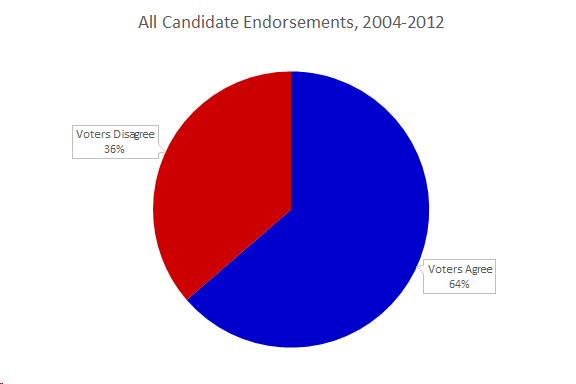
I also find it interesting to compare my endorsements with the outcomes of the race. Across all levels of government, only considering races where I have made an endorsement, the voters agreed with my choice about sixty-four percent of the time, and disagreed with me about thirty-six percent of the time.
Voters tended to be in agreement with my endorsements more often at the state and local levels than at the federal level. In federal races we only agreed about fifty-five percent of the time, compared with seventy percent at the state level and sixty-seven percent at the local level.
Ballot Issues
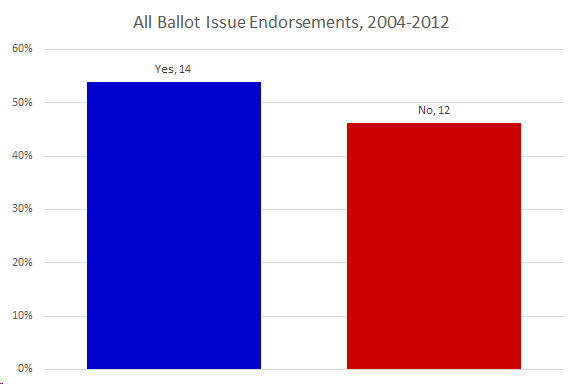
Between 2004 and 2012, I have reviewed and evaluated twenty-six ballot issues—an average of 2.89 per year—composed of ten proposed amendments to the Constitution of Virginia and sixteen local bond issues. In all, I have endorsed voting ‘yes’ on fourteen issues (54 percent), and ‘no’ on twelve (46 percent). I have made an endorsement in every ballot issue put before me since 2004.
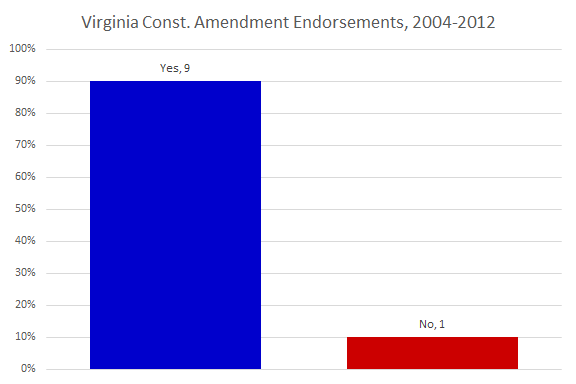
There is a very heavy skew between the two types of ballot issues. Among the ten proposed amendments to the Constitution of Virginia, I endorsed voting ‘yes’ nine times (90 percent) and ‘no’ only one time (10 percent). There is no particular reason for this, except that the vast majority of amendments proposed in Virginia since I began making endorsements have been completely innocuous. I only recall two amendments that I would say were controversial, and among those I endorsed one ‘yes’ (property rights in 2012) and one ‘no’ (marriage in 2006).
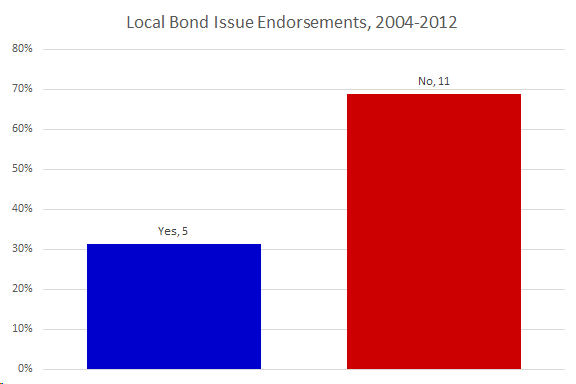
The skew goes the other way when it comes to county bond issues. In Virginia, local governments must put bond issuance to a voter referendum. Of the sixteen such referendums put before me since 2004, I have endorsed voting ‘yes’ five times (31 percent) and ‘no’ eleven times (69 percent).
Government bonds are a form of public debt. They are issued in return for a short-term influx of cash, but must be repaid later plus interest. Thus, they should be used only when a project is too large to be funded directly from the general fund . . . which is rare in the affluent counties of northern Virginia where I have lived since 2004. Particularly when it comes to school bonds, I reject any major capital expenditures on U.S. schools—which are among the best-funded schools in the world—unless those expenditures are tied to significant school reform.
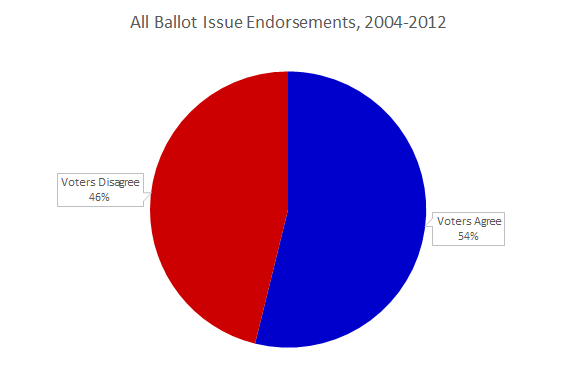
Comparing my choices with the outcomes of the votes on these ballot issues, the voters agreed with me about fifty-four percent of the time, and disagreed about forty-six percent of the time. There is, however, a big difference here between the two types of ballot issues. On amendments to the Constitution of Virginia, the voters agreed with my endorsements a whopping ninety percent of the time . . . but on local bond referendums, they only agreed with me thirty-one percent of the time.
I attribute this, more than anything else, to the average voters’ lack of understanding about what bonds are and when they should be used. Many simply vote ‘yes’ because they support schools, parks, roads, or whatever, and do not actually evaluate whether new public debt is necessary in each particular case.
Conclusion
I am happy to report that I am still politically independent (not that any of my readers should be surprised). I do continue to have a pronounced lean to the Republican side of the spectrum, but I am willing to endorse and vote for any candidate of any party (or no party) . . . if I think they deserve it.
Comparing this year’s statistics to those I calculated in 2010, there was a significant increase (from 25 percent to 29.9 percent) in the number of races where I made no endorsement. This is attributable primarily to the soil and water commission and school board election cycles. Between the two major parties, Republicans gained a bit (from 53 percent to 55.3 percent) and Democrats dropped significantly (from 16 percent to 10.6 percent).
The drop in my endorsements of Democratic Party candidates is primarily due to the party’s hard-left shift in opposition to civil rights, particularly the right to life, religious liberty, and the right to keep and bear arms. Not long ago, Virginia Democrats tended to be moderate pragmatists on these (and other) issues, but of-late they have been falling more in lock-step with the national party. This has made it much more difficult for me to support them.
The small Republican gains came mostly from the party’s hit-and-miss post-2008 corrections. Some pockets of the party began to re-embrace the values of federalism and limited government, which allowed me to vote Republican in some races where I might otherwise have voted for an independent or third-party candidate. This also helps explain why independent and third-party endorsements saw a bit of a drop over the same period (from 6 percent to 4.3 percent).
And what does the future hold? Well, we’ll all just have to wait and see.
